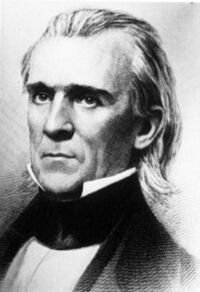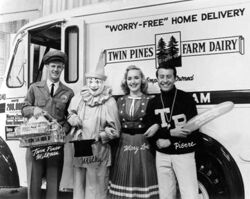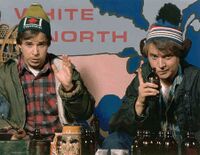James K. Polk
James Knox Polk (November 2, 1795 – June 15, 1849) was the 11th U.S. President. While "Making America Better" is an ongoing concern with victory just around the corner, Polk was renowned for at least making America bigger.
Early life[edit]
Polk was born in a log cabin in North Carolina, an attribute that would do wonders for Abraham Lincoln but did not do much for Polk. He was one of 10 children, named after his grandfather, James Knox, founder of the School of Hard Knox. Polk's father Samuel refused to declare his belief in Christianity at the young Polk's baptism and, tit-for-tat, his minister tipped over the font and stormed out. Despite that, Polk turned out pretty well, though historians never discuss his progress in the afterlife.
The Polk family moved to Maury County, Tennessee and, by all accounts, took over, his father becoming a county judge. Polk went to U.N.C., then studied law under Felix Grundy and followed him to the Tennessee State Senate. Polk touched all the bases for a young politician: joining the military, operating a successful law practice, courting and marrying the well-educated Sarah Childless, running for office and tending an open bar at the polls, and hooking his political wagon to Andrew Jackson so tightly as to become known as "Young Hickory" or occasionally "Little Andy".
Coming to Washington[edit]
In 1824, Polk's mentor ran for President but lost to John Quincy Adams, owing to the "Corrupt Bargain" by which the fourth-finisher traded his candidacy for a comfortable sinecure in Adams's government. The disparaging term was coined by Polk and other malcontents who did not realize that, in Washington, anything of value can be traded for anything else. Polk got into the government, representing TN-06 in the House of Representatives, but tended to vote against anything Adams proposed. His first major speech, entitled "Let's Ditch the Electoral College", was by all accounts a dud, advancing a wacky idea that has never been raised since then.
When Jackson ran again in 1828 and this time defeated Adams, Polk was a campaigner, pencil-sharpener, and all-around boot-licker. Jackson vetoed one road-building project after another, notably including the first Interstate highway located entirely within Kentucky, and many suspect that Polk was Jackson's ghost-writer. Another thing Jackson opposed was the Second National Bank, which he accused of being a federal bank cartel, another archaic concept that modern Americans do not have to worry about.
With Jackson's support, Polk became Speaker of the House. Polk had fond memories of slaves on the family farm, and enforced the rule against the House debating any petitions about slavery, relying on shouting matches with John Quincy Adams, now a congressman. But Polk never challenged anyone to a duel.
That's enough of that[edit]
After 14 years in the House, Polk challenged Newton Cannon for Governor of Tennessee, trouncing him in debates so thoroughly as to make him claim he had to return to the Capitol to focus on the People's Business. Polk focused on his own business, which was relieving Cannon of his job. The governor had no veto power nor many jobs to hand out, and it is as inscrutable why Polk wanted the job (especially over Speaker of the U.S. House) as it is why Cannon wanted to hold onto it.
As Governor, Polk got absolutely nothing through the Tennessee legislature and clung to his desk to ride out the Panic of 1837. He apparently only wanted to use the office as a springboard to become Vice President of the United States. This was a disaster too, as the Democratic Party took one look at him and voted to endorse no one as the veep. Their 1840 ticket was, "Martin Van Buren and — Meh! You Decide!" Polk did get one vote, from an Elector who was supposed to vote for someone else. The Whigs swept into power and Jackson and Polk consoled themselves with hot toddies. In 1841, the Whigs ran James Jones for Governor against Polk, Jones having a notable sense of humor, and Polk suffered the only loss of his political career.
Polk fixated on the 1844 campaign and his longstanding hope of becoming Vice President and having a plush office in which to wait for someone to die. However, surprising no one more than himself, Polk became the President, on the basis of competing Letters to various Editors, all awkwardly saying the same thing, namely, that the U.S. should gobble up Texas, which had just seceded from Mexico, despite the risk of war.
President[edit]
Polk had a 170–105 victory in the Electoral College, which candidates ever since have called a "landslide" to paper over a nail-biter at the polls. In those days, there was no Secretary of Railroads, Secretary of Blacksmithing, and Secretary of Handing Out Cash to Bums; in fact, the entire Cabinet was only six people. However, much like Joe Biden stressing gender diversity, Polk wanted only a Cabinet spread over America's most populous states (involving men who didn't dream of becoming President). The obvious result was to have a reason not to select the best people.
Nevertheless, Polk succeeded at a limited game plan, mostly involving fattening up the United States.
Oregon[edit]
Many Americans believed the nation should extend "from sea to shining sea" — not only so the famous song would make sense, but to ensure that everyone everywhere could read their blogs — a philosophy described as Manifesto Destiny. To this end, he undertook delicate negotiations with Great Britain regarding splitting away the Oregon Territory from what became Canada. Polk favored the 49th parallel as a boundary, despite the way the line awkwardly sliced through islands and peninsulas. Polk informed Britain of the Monroe Doctrine, under which Europe should butt out, but this only baffled Britain, as they had vacated Monroe and the rest of Metro Detroit long ago, pulling all the way back across the river. But the U.S. gave Britain the entirety of Vancouver Island and the deal was done.
Texas[edit]
Annexing Texas was another tall order. Polk did the formal job by decree, but awkward bits remained:
- Deciding on a border with Mexico
- Getting Texans to buy in
- Having a war.
The border was set at the Rio Grande. (Mexico wanted it at the Rio Nueces but Polk said, "Nuts!") Polk hoped that a show of force would convince the Mexicans to go away and roll burritos or something. The Mexicans went away but did something else equally stereotypical: They overthrew their president and replaced him with Paredes, who wanted to recapture Texas. General Chuck Taylor led the troops to the Nueces in tennis shoes. He was a Whig who was sure Polk was trying to ruin Taylor's career, and the feeling was mutual, leading to frequent shouting matches. Polk sent orders reading, "No! Keep Going!" and Taylor eventually arrived at the Rio Grande, across from Matamoros. On April 25, 1846, Mexican troops charged, doing what Polk called "shedding our blood on our soil." As the Mexicans were able to make the exact same claim, both sides had a casus belli (beautiful case) for going to war.
Congress declared war and authorized Polk to accept 50,000 volunteers to march toward certain death. Polk's other strategies were to scheme to remove Paredes and return Santa Anna to power and even just pay cash for Texas. The United States lifted its naval blockade of Mexico long enough to let Santa Anna sneak in, take charge of Mexico, and shorten the war. Instead, he took charge of the army and lengthened it. That did it! and suddenly all of Mexico was in play. Chuck Taylor entered the Mexican heartland and marched to Mexico City, a fact that resulted in several Mexican national holidays but no more than one footnote in any American textbook. On February 2, 1848, to get the gringos to leave, the Treaty of Guadalupe Hidalgo was signed and the southern boundary of the United States was settled. Mexico got a lot of cash, and the U.S. got a generous definition of Texas, and also a wide strip of what used to be northwestern Mexico.
For dessert[edit]
The Polk Administration also tried to purchase other bits of real estate:
- Cuba, which Polk thought he could get for a bargain.
- A railroad in Panama, so that no one would ever have to build a canal.
- Tesco.
The nation was not yet at war, but Congress's only question was whether the new properties would be Slave or Free. Consequently, no action was taken at all.
After the Presidency[edit]
Polk kept his word on two other issues:
- To serve only one term as President.
- Thereafter, to promptly curl up and die.
Louisiana made the second task much easier, being the southern extreme of his triumphal tour back home from the White House, despite one of Louisiana's signature outbreaks of cholera. Polk wanted to cut that part of the trip short, but found their hospitality contagious. Feeling ill, he got a quickie medical opinion that he had not caught cholera, followed by a quickie baptism that came just in time and hopefully was more sound than the diagnosis.
See also[edit]
| Preceded by: Tyler |
U.S. President 1845–1849 |
Succeeded by: Taylor |




